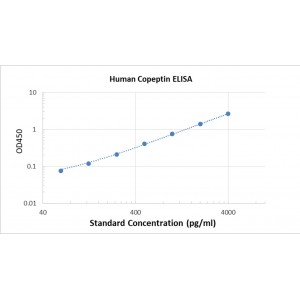 View larger
View larger
Human Copeptin, CPP ELISA Kit
BG-HUM10444
Human Copeptin ELISA KitFor research use only. Not for use in diagnostic procedures.For general protocol and instruction, please click the following links:Quantitative Elisa Kit InstructionSandwich ELISA kit general instruction Competition ELISA kit
Data sheet
| Immunogen/Antigen | synthetic and native copeptin peptide |
| Background | Copeptin (also known as CT-proAVP) is a 39-amino acid-long peptide derived from the C-terminus of pre-pro-hormone of arginine vasopressin, neurophysin II and copeptin. Arginine vasopressin (AVP), also known as the antidiuretic hormone (ADH), is involved in multiple cardiovascular and renal pathways and abnormal level of AVP are associated with various diseases. Hence measurement of AVP would be useful, but is not commonly carried out in clinical practice because of its very short half-life making it difficult to quantify. In contrast, copeptin can be immunologically tested with ease and therefore can be used as a vasopressin surrogate marker. The concentration of copeptin in the blood circulation ranges from 1 to 12 pmol/L ( 5 to 60 pg/mL) in healthy individuals. The levels of copeptin are slightly higher in men than in women and are not influenced by age. In response to serum osmolality fluctuations, the kinetics of copeptin are comparable to those of vasopressin. For example, patients with an electrolyte disorders such as diabetes insipidus with very low vasopressin concentrations also show very low copeptin concentrations in blood plasma. On the other hand, patients suffering from syndrome of inappropriate antidiuretic hormone secretion show high concentrations of both vasopressin and copeptin. |
| Alternate Names | copeptine, CT-proAVP |
| Assay Type | Sandwich ELISA |
| Kit Type | Colorimetric |
| Assay Time | 4.5 hours |
| Sample Type | Serum |
| Assay Range | 62.5 to 4000 pg/mL |
| Sensitivity | 20.6 pg/mL |
| Specificity | Only recognize synthetic and native copeptin peptide |
| Recovery | 95.3% - 108% |
| Precision | Inter-assay-- less than 7.8%; Intra-assay-- less than 3.6% |
| UniProt ID | P01185 |
More info
Human Copeptin ELISA Kit
Target Introduction
Related Products
Human ApoA1 ELISA Human ApoB ELISA Human Copeptin ELISA
Human CK-MB ELISA Human D-Dimer ELISA Human FABP3 ELISA
Human Galectin-3 ELISA Mouse Galectin-3 ELISA
Human GDF-15 ELISA Human PAF-AH/Lp-PLA2 ELISA
Human Myeloperoxidase (MPO) ELISA Human Myoglobin ELISA
Human NT-proBNP ELISA Canine NT-proBNP ELISA
For protocols and availability questions, please fill out our contact us form and make sure to include your company name, business email, and phone number. We will contact you within 24 hours.
Different lot may vary, please follow the instruction coming with the kit.

